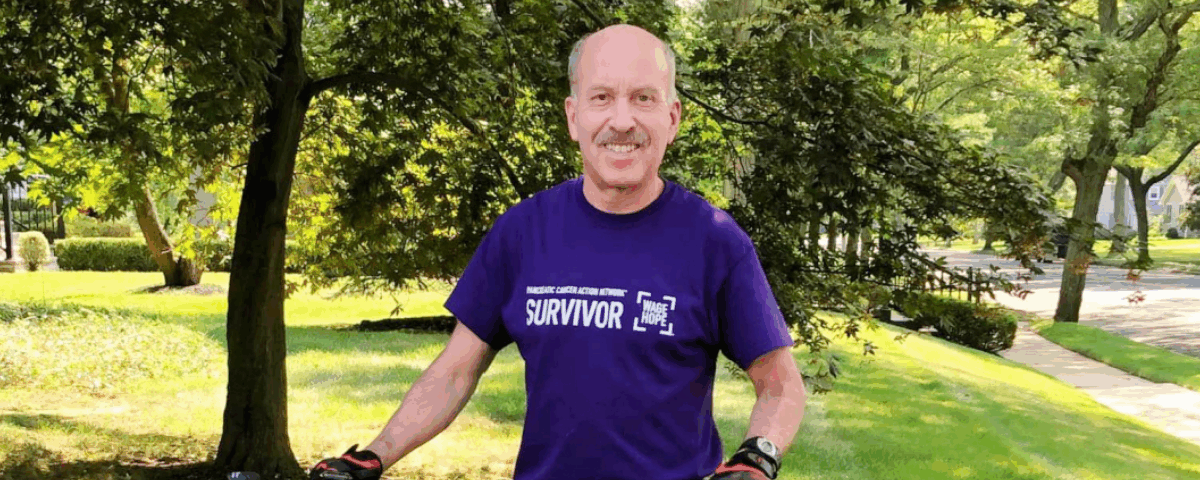
What a difference patients make: Honoring the impact of cancer clinical trial participants
November 3, 2025Beating the odds: Steven Merlin’s journey through pancreatic cancer and clinical trials

When Steven Merlin was diagnosed with pancreatic cancer in 2012, at age 55, his doctors did not give him much cause for hope. They recommended therapy focused on managing symptoms rather than aggressive treatment, despite his otherwise excellent health. A cure was out of the question: with its 12.8% five-year survival rate, this disease is one of the deadliest types of cancer. Yet eventually, Steven convinced his doctors to opt for the more intensive treatment plan—and later, a clinical trial.
“I told them, I have plenty to live for and nothing to die for,” Steven said. “Reluctantly, they agreed. I could tell they thought it wouldn’t make a difference, but I surprised everybody.”
Today, 13 years later, Steven is considered cured, though he still takes maintenance treatment every day. Thanks to advances in precision medicine—and Steven’s talent for self-advocacy—he beat the odds. Now, he focuses on giving back through research advocacy, as a member of ECOG-ACRIN Cancer Research Group’s (ECOG-ACRIN) Cancer Research Advocates Committee. He also helps other patients with cancer of the pancreas. This November, in honor of Pancreatic Cancer Awareness Month, we highlight Steven’s story.
When you were first diagnosed, how did you approach treatment decisions, and what led you to a clinical trial?
I was lucky because I have a strong medical background. I trained as a medical technologist and worked in basic and clinical research. Throughout my career I worked at, among other places, the National Institutes of Health, the Ludwig Institute for Cancer Research, and Weill Cornell Medical College. Because of my background, I knew a clinical trial would likely make a difference for me.
I was diagnosed with stage 2b pancreatic cancer, though during my surgery it was restaged as stage 3. A couple of weeks later, a post-surgical CT scan showed that the cancer had spread to my liver, making it stage 4. The tumor board recommended palliative chemotherapy, which surprised me. I was in excellent health, often biking hundreds of miles per week, and I was willing to try aggressive treatment options. After a few months, we discovered the palliative treatment was not working and the cancer had spread. I convinced my doctor to let me try a more intensive chemotherapy regimen, which was much more effective. During that time, I had genetic testing done and learned I had the BRCA2 gene mutation.
In 2012, precision medicine for pancreatic cancer was in its infancy—but my doctor told me BRCA2 was considered targetable, and I might benefit from a type of targeted therapy called a PARP inhibitor. After that, every week, I searched ClinicalTrials.gov for trials of PARP inhibitors. I reviewed new studies presented at major medical conferences. In May 2014, I came across my holy grail: Dr. Susan Domchek, at the University of Pennsylvania’s Abramson Cancer Center, had just presented her ongoing trial testing a PARP inhibitor for patients with BRCA-mutated pancreatic cancer at the ASCO Annual Meeting.
How did you go from reading about the trial online to becoming a participant?
First, I called the National Cancer Institute, but they didn’t know anything about the trial. Then, I called the Pancreatic Cancer Action Network (PanCAN). They also didn’t know anything. I emailed them an article about the study and Dr. Domchek’s contact information at the University of Pennsylvania. PanCAN put me in touch with a clinical research nurse at Penn, and believe it or not, she also wasn’t aware of the trial. Long story short, they finally connected me directly with Dr. Domchek. All that to say, it’s important to be persistent!
I had all my medical records and scans on file at home, so I was able to overnight them to her. This was before patient portals were common, so I always made sure to request copies of my records. She reviewed everything and told me, “You’re a perfect candidate.”
After that, I had to update my primary oncologist. Together, we decided to continue my current treatment until it was no longer working, since it had been so effective for me, and then consider the trial. Dr. Domchek held a spot for me. When I finally enrolled, I was the first patient in the United States to join.
What happened once you began the trial?
The trial lasted 18 months and I had what they called a complete response. All signs of my cancer had essentially disappeared. Here I am, 13 years later. I still take the drug daily to help keep cancer from coming back—it’s a PARP inhibitor called rucaparib.
Remarkable.
This is why I tell others to consider clinical trials. There are so many misconceptions—people think they are going to be a guinea pig or a lab rat. That is just not the case. Research shows that patients who participate in clinical trials have better outcomes than those who do not. They are followed very carefully by their care team. If the experimental treatment is effective, like in my case, participants get access to that new treatment before anyone else. If it’s not effective, they still get excellent care and closer monitoring than the general patient population.
Plus, you never have to worry about placebos in cancer trials, because placebos are never used in place of the standard treatment; they are only used when a new drug is added to the standard approach.
How are you involved in cancer research and advocacy today?
At ECOG-ACRIN, I participate on the Gastrointestinal Cancer Committee and the Microbiome Working Group. I share the patient perspective with researchers but also try to learn as much as possible so I can effectively communicate with others about the benefits of clinical trials.
I also mentor other patients, working with advocacy organizations like PanCAN, Let’s Win Pancreatic Cancer, and the Seena Magowitz Foundation. I help them understand their diagnoses and navigate treatment plans. I help find financial assistance and resources if necessary. This has become my whole life. I’m really driven. I think about people who never find their calling in life, and here I am, lucky to have found a second calling.

